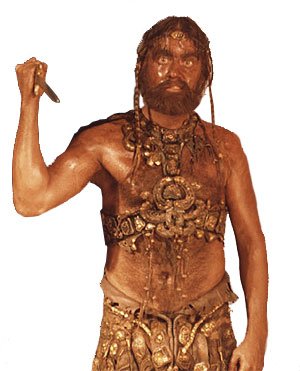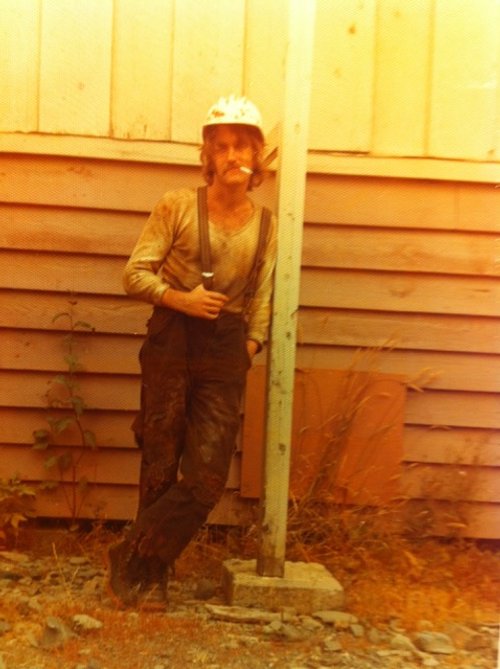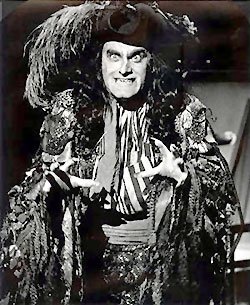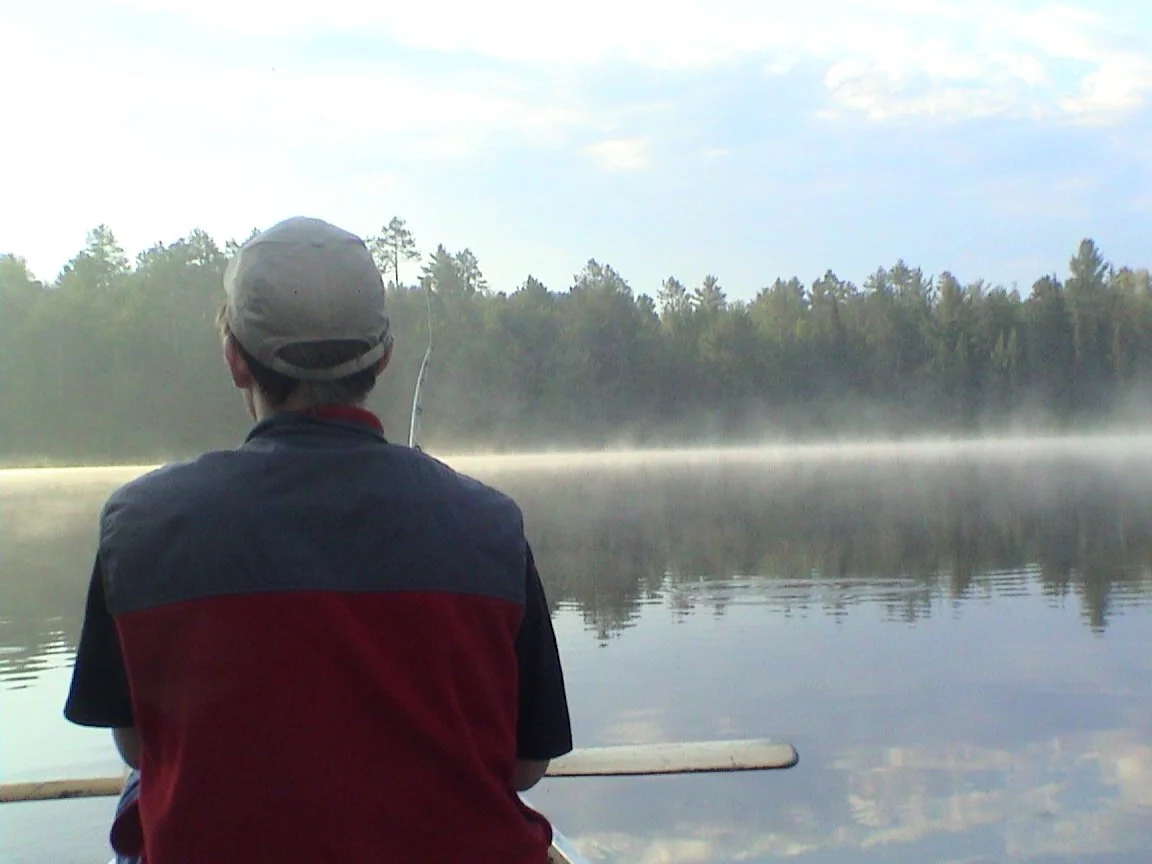A note from Peter O’Toole to John Neville, in Canada, about my Bottom. As a pal of Nat’s, he came to see our final production and wrote me this generous note in the bar after the show! Upon arriving back in Canada, it opened major doors. I still wonder whether Nat asked him to write it. It is quite wonderful to be loved by your director.
Me as Edgar and Peter Ustinov as King Lear, directed by Robin Phillips, at Stratford. Peter was the funniest man I ever met, capable of any accent, any musical instrument, any animal call, any sound he might think of. Stomach-aches from listening and laughing became a rehearsal-hazard! I was once told that every other young actor in Canada hated me for being cast as Edgar. Surrounded by greats like Douglas Rain, Bill Hutt, Martha Henry and Peter, I could not have cared less. It was the finest theatrical experience of my life.
The brilliant Heath Lamberts as Cyrano de Bergerac, and me as his best friend LeBret, at the Shaw Festival and Royal Alex in Toronto, directed by Derek Goldby - my second finest theatrical experience!
Chiron, Titus Andronicus, directed by Brian Bedford, starring Bill Hutt, at Stratford, Ontario. Bill was astonishing as Titus, especially before he baked my head in a pie for my mother to eat.
Deborah Tennant as Elmire/Mila, me as Orgon/Mulroney, in Tartuffe, for the Neptune Theatre in Halifax, then CBC, directed and adapted by Richard Ouzounian, starring the delightfully-talented Walter Borden, as a Reganesque Tartuffe.
Professional Acting Resume
Film reel
SOL on You Tube
Rodger Barton
I am a very proud Canadian! I have been an actor, teacher, single parent, monologue coach, and writer for most of 35 years. I spent 7 seasons with the Stratford Festival in Canada, doing eight Shakespearean productions under the great Robin Phillips, many with Brian Bedford, Martha Henry, Bill Hutt, five productions with Maggie Smith and two with Peter Ustinov.
Around twenty years ago, I decided to help young people love Shakespeare as much as I do. To do that, they had to play him out loud. To begin playing him aloud they needed cut scripts. I discovered and implemented the thought-verse formatting, and then noted the series to finish the job. Interestingly, a French teacher did a meticulous final proofing. I combed the scripts endlessly. It took two years to complete 12 plays. While creating them I read them, and re-read them, and re-read them some more aloud, with Keith Knight - taking equal turns at 'Hamlets and Horatios.' They were only finished when we agreed that they made complete sense. I then sold paper versions of the series for several years. New Year's 2013, in an effort to trump budgets and bores and stick to my purpose of growing love for Shakespeare, I decided to post the whole series on this website for free. In the last 12 years I have had about 50,000 scripts downloaded, worldwide. As old age stares me down, I have decided to minimally monetize my life’s work. If anyone thinks this work has been easy, and should remain free, there are 25 plays to do. Go ahead, amuse me. Every decision is excruciating and each script has thousands of them. With Keith gone I simply could not tackle another, alone.
Of course, I don’t expect teachers to be very practiced at teaching communication skills, or directing readings of Shakespeare; often they must lecture groups of students at a time, knowing what they are going to say. Directing Shakespeare Out Loud is about listening and reacting, not knowing; it all comes from the play, the words that make up the play, how they are spoken and performed - how they are invented! Trust me that out-loud practice of these texts will implant new vocabulary and rhetoric on the mental hard drives of students, better than silent reading ever could. The practice will build confidence in remembering and using other new words that come their way.
Theatrical talent certainly does help when teaching Shakespeare, but so does generosity of spirit. You should be as much a coach as a teacher. I have done most of the rigorous teaching by creating, formatting and noting the scripts, as well as providing audio-plays. If through regular, assigned, out loud readings and discussions, you get all your students using their voices, you will have accomplished much. With the SOL scripts, it can be done!
The SOL audio recordings, produced during Covid, are my newest out-loud offerings. I played all the parts except the French ladies in Henry V. The audio files for each play provide choices for stresses, thoughts and emotions. The monologue page, currently provides pdfs and mp3s for 40 of Shakespeare’s greatest soliloquies and passages. None are definitive, no performance is, just the best that I could do, at that time. Teachers might try a few as well.
Like the world-class actors I had the pleasure of working with, I try to make my text sound like heightened, everyday speech, and not the chanting of some poem! Scholars like to pontificate about the rhythm of verse, like some magical chant to unlock a story or character. Well, good actors never want to sound predictable. In the 5 Shakespearean productions I did with Maggie Smith she never mentioned rhythm once, and had someone else tried this nonsense, she would have snorted at them - ‘never that simple, my dear!’
The character must need the words, need to invent the words to accomplish their goals. Michael Langham called this inventing of language, fresh-minting. Would you want to go to a production only cast with scholars? Not me. I do not want to hear three hours of ponderous rhythm - rules of the verse. I want the text well-cut and I want to hear the characters inventing their language, as we do everyday. All the greats do it; they can also string many diverse thoughts into coherent arguments - a prime characteristic of verse.
Michael Langham once said, “The most valuable emotion in Shakespeare is wonder.” How could a Montague and Capulet fall in love?
Emotions are the result of thoughts and NOT the other way around. Figuring why Will’s characters have such extraordinary things to say and think, are the puzzles to be solved. That never stops until and run ends, and often not even then. That is how the inner world is built. Martha Henry told me that she ran Prospero everyday at Stratford, even the day after the show had closed. It is a huge role! It needs huge life and imagination, huge exploration, everyday. As an actor you cannot solve it all with some magical rhythm-wand, you just keep working on it, dividing the thoughts ever finer, allowing your emotions, ever deeper.
Ghost, pirate captain at Young Peoples’ Theatre, in Toronto, directed by Richard Greenblatt. Peter Moss was the fine AD. Scaring small children at 10 in the morning, was a great honour!
I played Frank twice; I can’t imagine why!
I found the fish and my son, Tyler, caught most of them.
We were hunters of pike, and speakers of speeches.










